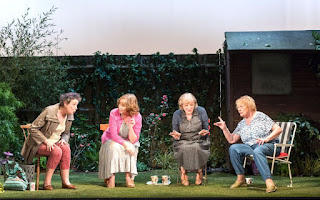Theater: Escaped Alone--a mosaic of personal and global apocalypse
Escaped Alone, a short, intense play written last year by British playwright Caryl Churchill (1938-) explores anxiety from both a
micro- and macro-perspective. Its structure is of two superimposed narratives.
One shows four seemingly normal British grandmums in their backyard chatting
about mundane issues of common discourse (we all used to do that before social
media).
The other cuts to a (maybe) alternate reality in which one of the ladies narrates a harrowing apocalyptic narrative that ranging from bombs to fantastic animal mutations to mass stress-induced psychosis.
The other cuts to a (maybe) alternate reality in which one of the ladies narrates a harrowing apocalyptic narrative that ranging from bombs to fantastic animal mutations to mass stress-induced psychosis.
The play is a
series of rapid-fire five minute scenes that flips back and forth between these
two constructs, effectively enhanced by the lighting and sound design that
contrasts the backyard (birds twittering, sun shining) with a humming,
throbbing, geometrically framed blackness for the apocalypse narrative. The
dialogue is rapid, witty, and goes in many unexpected directions, not always
following normal rules of syntax and logic. As the play goes on, a sense of
unease creeps in, as we hear about marital or other downfalls the women have experienced.
Since they know each other well, these do not receive the usual dramatic
emphasis—they already know that one has been in prison—so often move rapidly to
the next talking point (about cooking, say). So the listener must concentrate
carefully to discern the plot evolutions. The climax of sorts comes when three
of the ladies deliver 1-4 minute monologues that reveal their own inner
torment, one eloquently, another with schizophrenic obsessive language that is
shocking and scary. One interpretation of this is that cataclysm is always
around the corner, both in a historical-scifi sense, and in our own personal
failings and journeys. While the two narratives are linked in affect, they do
not seem to be linked in real time. The ladies in the backyard are not
themselves undergoing the scifi apocalypse, but their own individual ones.
I was not as jolted by all this as many others in the
audience (and the NYT reviewer) seemed to be. The ladies’ conversation was a
little too witty to evoke existential dread in me in the way that Philip Ridley's Mercury Fur did (see my review). Also, the rapid-fire scenes,
well suited to our short-attention span era, did not allow sufficient evolution
and building of tension. The play runs only 50-55 minutes, and something that
short really needs to pack a punch to leave an impact. That Escaped Alone did not do so for me is no
flaw of the playwright’s talent for dialogue, but perhaps for construction and
pacing. Building a play to soliloquies is certainly a familiar device, but did
not seem well suited to this construction. Doubling the length of this play
would not have worked, as the rapid scenes would have become monotonous--so
perhaps this was indeed the best overall structural solution for this
particular inspiration.
Ms. Churchill has written over fifty plays. She has moved
from 1980’s efforts dealing with politics and feminist themes to plays like
this one that experiment with language, structure, and logic. Love and Information (2012) received
renown in the UK for it’s mosaic-like structure of micro-scenes, performed by a
cast of 100—I would love to see that done sometime. Escaped Alone is a more manageable version of this idea, sort of a
theatrical montage in which the viewer creates the reality by having to knit
together short snippets. It is fascinating and a little ironic that a 79 year
old playwright has come up with a creative and meaningful way to use millennial
micro-dialogue. Perhaps it takes a generational outsider to see Twitter as an avant garde
artist’s composition tool, rather than a means of normal communication.
Why this deluge of apocalyptic themes in media, TV, movies, plays, etc? By most accounts we live in an era of less war, less death, less abject poverty, less disease, and more creature comforts than at any prior time. Maybe it takes relative abundance and stability to have the time to feel neurotic. After all, Godzilla films and nuclear warfare movies abounded in the 1950's alongside unprecedented prosperity. Is the human mind genetically programmed to always need something to worry about, so as to keep in training for the modern version of a wild animal attack?


Comments
Post a Comment